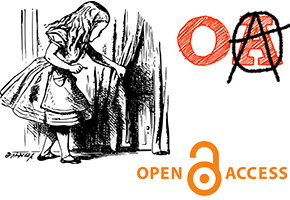
Since the advent of the internet, large publishers have increasingly locked electronically available research behind paywalls while costs rise at alarming rates. In many cases, researchers not only pay to publish their research, but then universities have to pay to access the same research that their own faculty and staff created at the institution. This restriction of access to research and knowledge stifles innovation and increases costs for students.
In 2013 California State University, Northridge became the first campus in the CSU system to sign the Berlin Declaration, which “calls for open access to knowledge in the humanities and sciences, recognizing that the Internet has changed the way knowledge and information is disseminated” ( CSUN Today ).
CSUN and the Oviatt Library value Open Access, but often it is a misunderstood concept. A resource on the International Open Access Week website explains that “Open Access is a growing international movement that uses the Internet to throw open the locked doors that once hid knowledge. Encouraging the unrestricted sharing of research results with everyone, the Open Access movement is gaining ever more momentum around the world as research funders and policy makers put their weight behind it.” ( We Support Open Access) And it is a truly international effort — institutions and universities around the world progressively continue to join the ranks of those who support the OA movement.
Here at the Oviatt Library we celebrate Open Access Week every year, and this year we continue that tradition with our 5th Annual Open Access event and award. We are proud to acknowledge contributions of the faculty in the Department of Physics & Astronomy. Oviatt Library Dean Mark Stover notes that “the CSUN Department of Physics & Astronomy [has] demonstrated leadership on our campus by depositing the largest volume of faculty research to ScholarWorks, our campus Institutional Repository, of any department on campus.”

The 5th annual Open Access event focuses on open access in research and publication in the humanities. Keynote speaker, Eileen Joy, Director of punctum books will discuss the drive to bring more open access publishing channels to the humanities, the obstacles faculty face, and how they can and should overcome them. In addition, CSUN’s Scott Kleinman, recipient of a Mellon Foundation grant for his WhatEvery1Says Project (WE1S) will discuss the paradox of funding for open access humanities projects that must use proprietary restricted data.
This free event is being held in the Oviatt Library Ferman Presentation Room with complimentary refreshments. Please RSVP at https://library.csun.edu/events/oa-radical-transformations



